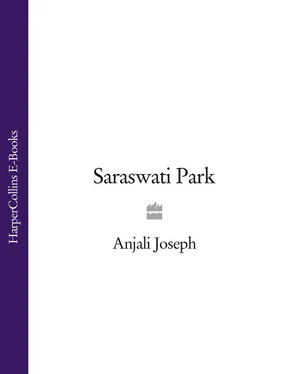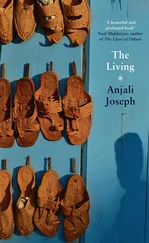Mohan stumbled up. He looked around; most of the letter writers had arrived. Khan nodded at him. ‘Yes yes, you go.’
‘I’ll go and come,’ he muttered. He reached for the book, then left it where it was.
‘Don’t walk so fast, re!’ Kamble ran after Mohan, who had shot out in front of a taxi. The driver was outraged; he braked, gave the horn a long blast and leaned out of the window to question Mohan’s relationship with his family. The letter writer ignored him and hurried on. They crossed the road and headed into the arcades, which were shot with hot strips of sun.
‘Look,’ said Mohan suddenly. ‘None of these people has a licence either.’ He stopped and waved at the hawkers, thin young men in tight shirts and jeans, belts with exaggerated buckles; they folded their arms and eyed him in return.
Kamble shrugged. ‘It’s part of what they’re doing everywhere, they say it’s to clear the main roads so people can walk more easily in the morning,’ he said apologetically. He put a hand on Mohan’s arm and smiled at one of the more aggressive looking hawkers.
‘Corruption. The booksellers have been there for years – people who take the train stop there on their way to office.’
‘Well –’
‘Quickly!’ Mohan had seen a bus, rolling to a halt a few yards ahead; he pulled Kamble after him through a white stucco arch and they dashed for the stop.
‘You want to take the bus? But –’
‘It’ll be faster.’ They climbed aboard as the bus began to move, and pushed their way down the narrow aisle between the humid bodies of the other passengers.
The bus took an age to cover the short distance. Finally it reached the stop just before Fountain: they pushed their way to the front and jumped down. Mohan was sweating; the back of his neck prickled. ‘Come on,’ he said. His head pounded. They darted across the first road, waited at the crossing, and started to cross the second, but as he hurried he felt a small release at his right foot: the strap of his sandal had broken.
Two green municipal trucks were parked near the junction. Mohan’s hand flew up to clutch his head. Men in dusty blue uniforms were picking up books by the armful and throwing them into the back of the nearer truck. His broken sandal flapping, he ran towards them.
‘What are you doing? You can’t do this! Stop! Wait!’ The man ignored him, and grinned at the drama. Mohan saw the thin bookseller from the day before. ‘Where are they taking them?’ he asked wildly.
‘Some warehouse or godown, I don’t know where. I don’t know how we’ll ever get them back.’ The young man stood still, his arms full of thrillers; he looked adrift, as though he had no idea what to do next.
‘Here, I’ll take some.’ Mohan started to scoop up the volumes scattered around them.
‘Oye, you can’t do that,’ the BMC man said. ‘They’re being confiscated.’ He picked up another armful and walked to the truck. A policeman, smacking his stick into his palm, strutted up. ‘Come on!’ he shouted. ‘Move on!’ He was bored, Mohan noticed; probably he wanted his lunch.
‘Come on, re,’ Kamble said. He took Mohan’s arm and tugged at it. Only a few books remained, lying on the ground and beside the railings. Mohan handed those he held to the young bookseller. One fell from his arms and Mohan stooped and picked it up, touched it to his forehead in apology. It was a business book, with confident red letters on the cover: Master of Your Own Fate .
Mohan, still clutching the book, allowed Kamble to pull him towards the crossing. ‘My sandal’s broken,’ he muttered.
He went home early, feeling dazed and unreal. The outer door was closed because it was the afternoon and a time of rest; the flat was warm, silent, and sleepy. His wife opened the inner door.
‘I thought it was you! You’re not well?’
‘Don’t attack me right at the door,’ he said wearily. He came in, and closed the outer door with a soft click.
‘Another book,’ she said.
He walked past her and deposited the books on one of the jars that covered the old table in the living room. He went to the kitchen, reappeared with a steel tumbler of water and sat down heavily; he rested his elbow on the small fringe of available space on the table and drank. When he’d finished he set down the tumbler, rubbed his forehead, removed his spectacles, and pinched the top of his nose.
‘Are you feeling unwell?’
‘No.’
‘Then what happened?’ Her voice had become sharp, but she hovered close to him.
He waved towards the books. ‘The BMC moved the booksellers away today – took all the books and threw them into a truck. They’re taking them to a godown somewhere.’
‘Just like that?’
He nodded.
She went into the kitchen, came back with a bottle of cold water and a jug and refilled the tumbler, half with the iced water and half with room-temperature water. He closed his hand around the tumbler.
‘Maybe it’s for the best,’ she said thoughtfully, and put one hand on her hip. ‘We’re running out of space for all these books anyway.’
He stared across the landscape of clustered jars. The table was old, from the house at Dadar; it was good Burma teak, and beautiful when polished, but they’d never used it properly. Over the years it had become a receptacle for jars of pickle, bottles of sauce and squash, tins of drinking chocolate, papers, paperweights, and all kinds of other objects that, someone had reasoned, were about to be in use. What a waste, he thought.
‘Oh, I had to tell you,’ she continued. ‘Your sister called.’
He looked up. ‘Vimla?’
‘How many sisters do you have? Milind’s transfer order has come through. They’ll have to leave in a few days.’
‘Oh.’
‘And they just found out that Ashish can’t take his exams this year, he has to repeat.’
‘What? Why?’
‘Attendance,’ she said.
He put on his spectacles again, diverted for a moment. ‘Always something new with that boy,’ he said, almost admiringly. Fecklessness was not a quality one had been encouraged to develop, or that one celebrated in one’s offspring; still, it cut a certain dash.
‘So they were wondering if he can stay with us till next year.’
Mohan smiled. ‘Of course, where else will he stay?’
‘With your brother?’ However, she smiled.
‘Ha!’
Lakshmi sighed. ‘It’s going to be a lot of extra work. And also expense.’
‘But we have the money from the printing shop. And what Megha’s been sending, we haven’t even touched that.’ His income from his daily occupation had never been considerable; in recent years it had dwindled to a trickle.
She nodded, then frowned. ‘You know that I’m fond of Ashish. But it’s a big responsibility. We’ll have to make sure he studies, attends regularly when college starts. You’ll have to speak to him. Make him understand he needs to be sincere.’
Mohan snorted. ‘I’m sure his mother’s spoken to him comprehensively,’ he said. He drained the second tumbler of water, put it into his wife’s hand, and went inside to change his clothes.
Seven in the morning, Ashish thought he must be dreaming. He stood under the big notice boards and read the names of suburbs he had rarely visited: Belapur, Titwala, Vashi, Panvel, Andheri. It was too depressing.
Most of his possessions were in a large suitcase at his feet; he clutched a cardboard box filled with books, cassettes and compact discs that he had rushed around retrieving when his uncle arrived at six. His parents had been too harried to become sentimental; they would be flying to Indore in the afternoon and some of their things had already been sent by road. Ashish, with similar efficiency, had been plucked out of his life and sent to live with his aunt and uncle.
Читать дальше












